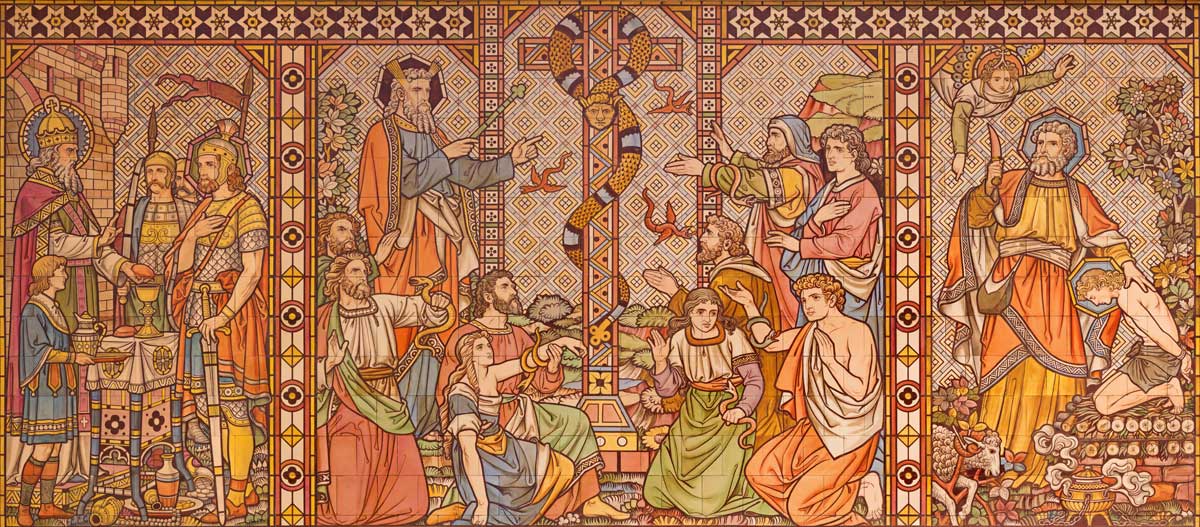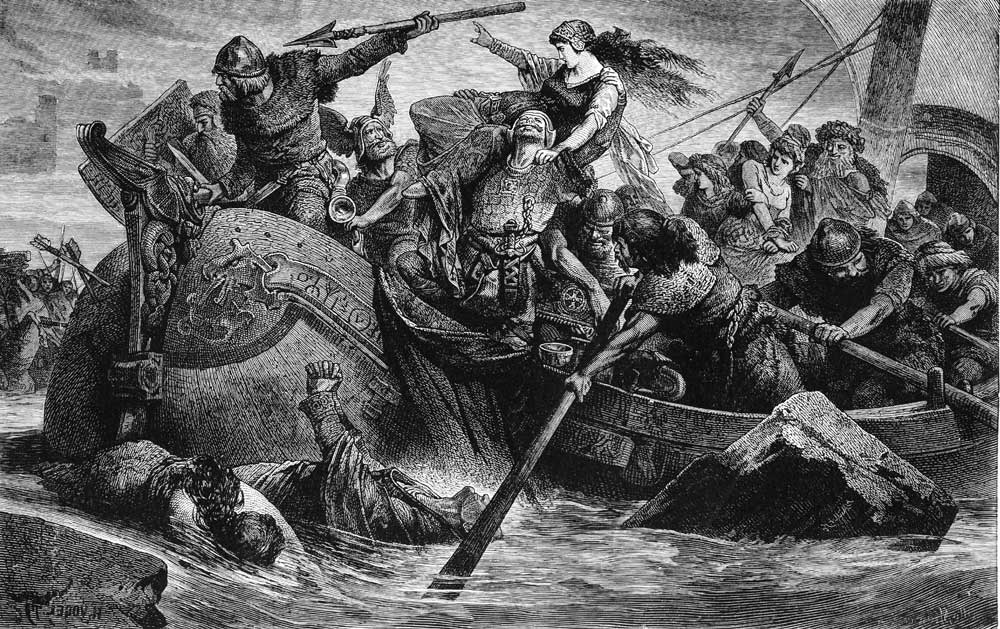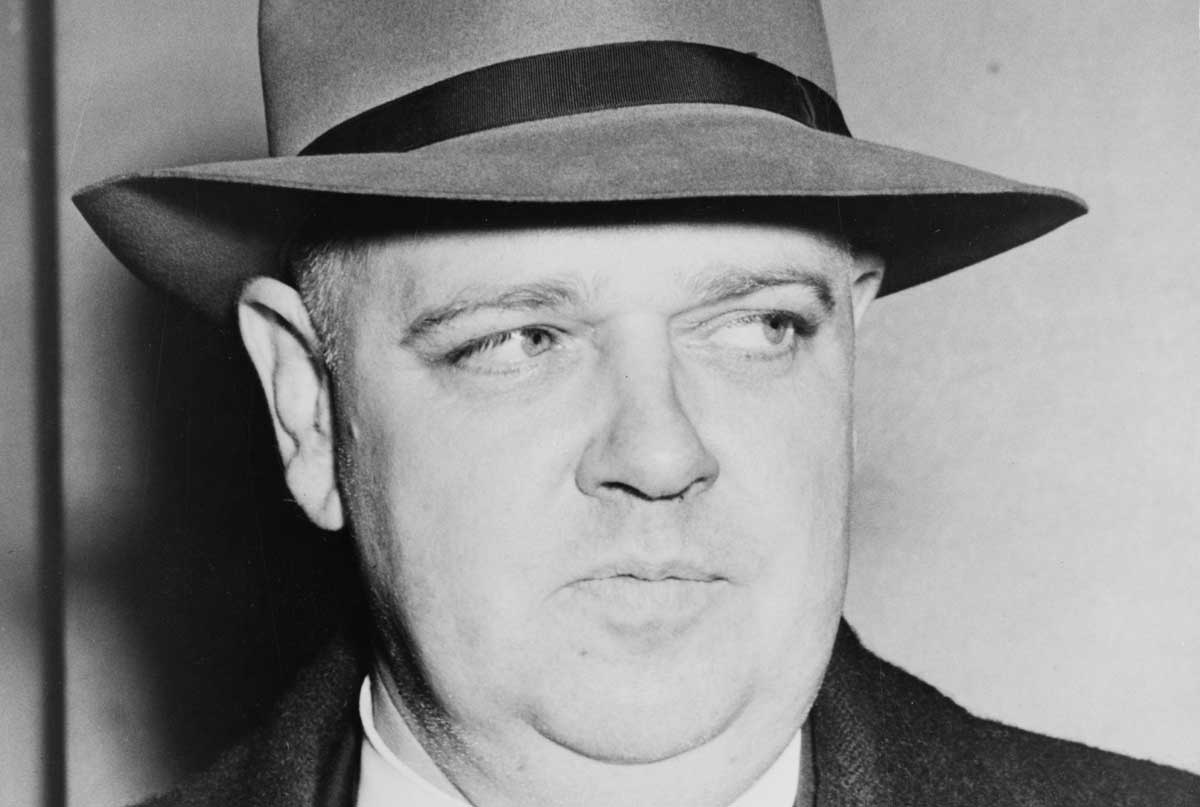Feature
The Great Jewish Plot
The Riddle of Nietzsche's Philosemitic Anti-Judaism
Friedrich Nietzsche's overt hostility toward and contempt for Christianity were unusual in his day, but in the following century they became, and remain, more common. Nowadays Nietzsche is something of a cultural icon, and his belief that Christianity is not merely false, but unnatural, harmful, and hostile to life is becoming more normative than many Christians realize.
The reasons for Nietzsche's hatred of Christianity—and "hatred" is not too strong a word here—are not always fully grasped. Far from being the result of a dispassionate and reasoned consideration of facts and evidence, Nietzsche's approach to the Christian religion was influenced not only by various personal issues that may never be fully explained, but also by a deep hostility toward Jews and Judaism.
Many people agree with Nietzsche that there is no God, and that supposedly divine rules are merely human inventions, leaving us free to follow our own inclinations to the furthest limit, without let or restraint. Such ideas are sweet music to the ears of those who desire only personal freedom without regard for future consequences—but some who agree with Nietzsche's anti-religious conclusions would not share the unusual thought processes by which he reached those conclusions. In particular, his conviction that Christianity was merely a Jewish trick, invented to enslave stronger peoples with a false slave morality, would be difficult for even the most articulate atheist to cogently defend today.
Apart from the larger question of a noted and highly influential contemporary thinker's attitude toward Christianity, there is the secondary issue of Nietzsche's still debated role in some tragic events of German history. Nietzsche's strong condemnations of anti-Semitism, as well as his favorable comments about individual Jews and even about the Old Testament, have been widely effective in distancing Nietzsche from the horrors of the Third Reich. If Nietzsche condemned democracy and called for the rule of an elite few; if he endorsed slavery and glorified war and violence; if he provided many quotes which, taken at face value, did seem to mesh perfectly with Nazi ideology—still, his positive comments about Jews and his negative comments about anti-Semites make it much more difficult to link him to the
Holocaust.
Praise for the False
It is too little realized that comments of Nietzsche's that appear to distance him from modern anti-Semitism are not always what they seem. Nietzsche's meanings are not always obvious, to be picked up easily off the surface, and that is the case here. If occasional seemingly favorable comments about Jews can in fact be reconciled with more consistently negative ones, it might help towards a more accurate evaluation of Nietzsche's place in the development of modern secular anti-Semitism.
Take, for example, Nietzsche's praise of the Jewish Scriptures. In The Genealogy of Morals, Nietzsche asserts his distaste for the New Testament, and goes on to say, "all honour to the Old Testament. I find therein great men, an heroic landscape . . . further still, I find a people" (GM III, 22). Certainly a conventional anti-Semite would never have praised Judaism in this way—but then, Nietzsche was never conventional, and it is a common mistake to read him too superficially.
To begin with, Nietzsche was, after all, an atheist, and the idea of a God laying down laws and rules with punishments for disobedience and rewards for obedience was anathema to him. Moreover, in The Antichrist Nietzsche explicitly denounced the Old Testament, saying, "The concept of God falsified; the concept of morality falsified: but the Jewish priesthood did not stop at this. . . . These priests accomplished that miracle of falsification, of which the greater part of the Bible is the document" (AC 26).
To understand how Nietzsche could praise a (to him) fundamentally false book that contradicted his most basic tenets, we need only to look back to Ludwig Feuerbach. This atheist asserted that conventionally religious concepts of God were merely projections of human consciousness; that religion was false, yet still significant as a profound human expression of aspirations toward justice and meaning in life. In the same way, Nietzsche could dismiss the Old Testament as false in "the greater part," yet still see the remainder, with its conquests, wars, and "the mighty and thoroughly free-born figures of the history of Israel" (AC 26) as the expression of a healthy consciousness.
"Originally, and above all in the period of the kings, even Israel's attitude to all things was the right one—that is to say, the natural one. Its Jehovah was the expression of its consciousness of power, of its joy over itself, of its hope for itself" (AC 25). This is contrasted in the same section, however, with the later transformation (which he elaborates on) from an originally healthy Jewish concept of God, allowing for power, conquest, and victory, to one cunningly devised by priests for their own advantage. This new concept of God imposed "a so-called moral order of the universe," including guilt, obedience, punishments and rewards—all of which Nietzsche blasted with great hostility.
So Nietzsche's praise of the Old Testament is merely praise for that part of it which, though untrue, allows for "healthy" manifestations of the will-to-power, while "the greater part" of it is condemned as a harmful fabrication that Nietzsche later blames directly for the emergence of Christianity.
A Twilight World of Misconceptions
Other favorable comments of Nietzsche's about the Jews also do not hold up under careful analysis. For example, in Beyond Good and Evil, Nietzsche states that "the Jews, however, are beyond all doubt the strongest, toughest and purest race at present living in Europe; they know how to prevail even under the worst conditions" (BGE VIII, 251). This may seem like very high praise, except that Hitler also wrote of the remarkable endurance and racial toughness of the Jews in Mein Kampf (vol. I, ch. 11, "Nation and Race"). This interest in the strange survival of the Jewish people was not just a mania of Hitler's, but was a common theme among secular anti-Semites who did not accept that God himself had preserved the Jews out of faithfulness to his covenant with Abraham, and so sought a more natural explanation.
It is interesting that the above quote from Beyond Good and Evil shows Nietzsche's recognition of the importance of racial purity. He did not elevate race to a central position in his thought, but he did have an interest in it, and he mentioned racial matters a number of times in his works. In The Genealogy of Morals alone we find references to "the stronger races" (II, 13), "a means to the purification of the race" (II, 13), the harmful effects of race-mixing ("the result of the crossing of too heterogeneous races," III, 17), "race decay" and "degeneration" (II, 19), the triumph of Judaism being possibly due to blood poisoning (I, 9), and the "fundamental instinct of a higher dominant race" (I, 2). More references could be given.
Another favorable comment Nietzsche made about the Jews needs to be carefully examined. In Beyond Good and Evil (VIII, 251) he wrote: "That the Jews could, if they wanted—or if they were compelled, as the anti-Semites seem to want—even now predominate, indeed quite literally rule over Europe, is certain; that they are not planning and working towards that is equally certain."
Claiming that the Jews could rule Europe if they chose to do so shows that Nietzsche saw "the Jews" as a vague and mysterious entity of hidden and secret powers. This has ominous implications that we can easily see in retrospect—and does anyone today want to maintain that nineteenth-century Jewish scholars, merchants, rabbis, and common people had the power to rule Europe? If they had really been so powerful, surely they could have prevented a pogrom or two, or at least won a first acquittal for Alfred Dreyfus. Nietzsche here inhabits a twilight world of serious misconceptions. Such misconceptions are not merely nonsensical—they are also dangerous.
This quote illustrates that Nietzsche had a very peculiar way of looking at the Jews—and for someone who changed his mind completely and went from high praise for Richard Wagner to bitter reviling, it is a small step from "are not planning and working" to "are planning and working." That Nietzsche was headed in this direction just before his collapse into complete insanity is evident from a comment he made in The Antichrist, where he says of the Jews that "with a non plus ultra of histrionic genius, they have known how to set themselves at the head of all decadent movements (St. Paul and Christianity for instance)" (AC 24). It is not that the Jews are decadent themselves, but rather that they use decadence for their own ends. Motivated by resentment against "life, prosperity, power, beauty, and self-affirmation," they have "a vital interest in making men sick" (AC 24). Thus, in Nietzsche's view, "all decadent movements" are the result of Jewish machinations.
For one more example of a seemingly positive quote about Jews, we note in Beyond Good and Evil that Jews—who have "the genius of money and patience"—could be bred with Germans, who have "the hereditary art of commanding and obeying." This was part of Nietzsche's plan for "the breeding of a new ruling caste for Europe" (BGE VIII, 251). Apart from the profoundly undemocratic as well as the imaginary nature of this speculation, we note that the Jews are considered from a peculiar perspective that denies them individuality and humanity.
The "Vampire" of Rome
Nietzsche could accept and even praise individual Jews such as Heine, Spinoza, or others who had somehow emancipated themselves from false concepts of God and morality—but for the Jewish people as a whole, and for their influence through Christianity on the development of Western culture, Nietzsche had a distorted and malevolent hatred. Perhaps the simplest way to bring this into focus is to point out that Nietzsche blamed the collapse of the
Roman Empire, the Protestant Reformation, and the French Revolution on Jewish influence.
Concerning the Roman Empire, we read in The Genealogy of Morals that the noble, superior, aristocratic, and healthy values of rapaciously imperialistic and warlike Rome were undermined by "the Jew," whom Nietzsche saw as "the incarnation of the unnatural . . . in Rome the Jew was held to be convicted of hatred of the whole human race; and rightly so" (GM I, 16). After rhapsodizing on the glories of Rome ("every relic of them, every inscription enraptures"), Nietzsche goes on to ask, "Which of them has been provisionally victorious, Rome or Judaea? But there is not a shadow of doubt . . . not only in Rome, but almost over half the world, everywhere man has been tamed or is about to be tamed," people bow down "to three Jews, as we know, and one Jewess (to Jesus of Nazareth, to Peter the fisher, to Paul the tentmaker, and to the mother of the aforesaid Jesus, named Mary) . . . Rome is undoubtedly defeated" (GM I, 16, italics Nietzsche's).
At this point, it is necessary to explain that Nietzsche considered Christianity to be synonymous with Judaism. This is manifest in some quotes from The Antichrist: "the Christian church, put beside the 'people of God,' shows a complete lack of any claim to originality" (AC 24); "the small insurrectionary movement christened with the name of Jesus of Nazareth is simply the Jewish instinct over again" (AC 27); "early Christianity deals only in Judaeo-Semitic conceptions" (AC 32); "We should feel just as little inclined to hobnob with 'the first Christians' as with Polish Jews: not that we need explain our objections . . . They simply smell bad. In vain have I sought for a single sympathetic feature in the New Testament" (AC 46, ellipsis in the original).
Thus, when Nietzsche says "Christianity was the vampire of the imperium Romanum—in a night it shattered the stupendous achievement of the Romans"; when in this context he describes Christians as acting "disintegratingly, poisonously and witheringly, like blood-suckers" (AC 58); in all of these and many other hate-filled comments, he is talking about Jews. Here we have the clearest possible description of Jews as bloodsuckers and vampires, using Christianity as a weapon to undermine what is truly good and noble, motivated by hatred and the desire for revenge. "Paul, with the logician's cynicism of a rabbi . . . St. Paul, the Chandala hatred against Rome, against 'the world,' the Jew, the eternal Jew par excellence, become flesh and genius" (AC 44, 58)—this was the reason for the fall of marvelous and wonderful Rome.
Decline from the Heights
In the same passage of Genealogy of Morals where Nietzsche gives his theories about the fall of Rome, he asserts that the Protestant Reformation was also a "movement of revenge" in which "Judaea triumphed again" (GM I, 16). To Nietzsche, the reassertion of Jewish-Christian biblical values over the splendor of the Renaissance papacy (see also AC 61) was merely the revolt of vulgar and low people against their aristocratic betters, inspired by Jewish values of democracy and equality that were hostile to unrestrained assertions of power by a social elite.
Still in the same section of The Genealogy of Morals, we read that the French Revolution also was the result of the insidious and corrupting influence of the Jews. "Judaea proved yet once more victorious over the classical ideal of the French Revolution." The destruction of "the last political aristocracy that existed in Europe, that of the French seventeenth and eighteenth centuries, broke into pieces under the instincts of a resentful populace." Nietzsche's ideal of "the aristocratic, the powerful, the high-stationed, the high-minded" (GM I, 2) succumbed to "the will to lowliness, abasement, and equalization" (GM I, 16), of which the Jews were the cleverest manipulators.
Few historians today would see the pampered and luxurious French nobility as representative of any sort of "classical ideal," and few would accept that the hidden hand of the Jew lay behind such widely disparate historical and social movements as the fall of the Roman Empire, the Reformation, and the French Revolution—but Nietzsche has never been renowned for his knowledge of European history. What is significant is the view of the Jews as the underlying source of Europe's spiritual and moral decline from the heights of a morally unfettered paganism. This outlook was by no means unique to Nietzsche.
A Weird Logic
If we understand that Jewish influence was synonymous with Christian influence, and that "Christian influence" meant not literal adherence to the teachings of Jesus, but rather the generally bourgeois European culture that had evolved out of a strongly Christian background, ideas of Europe having succumbed to Jewish influence seem less peculiar. What might otherwise seem like the ravings of lunatics in padded cells actually turns out to have a certain weird kind of logic. We can understand how it was possible to blame the Jews for both communism and capitalism, for atheism and Christianity, for the Reformation and the French Revolution, degenerate modern art, democracy, rootless cosmopolitanism, pacifism, and failure to sufficiently appreciate Wagner's operas.
But how can this deeply negative emphasis be reconciled with unequivocal condemnations of anti-Semitism? Nietzsche's condemnations are not as comprehensive or as unqualified as they are commonly thought to be. Here, as is so often the case with Nietzsche, a simple explanation is inadequate. He was condemning anti-Semites because they had a superficial understanding that did not get to the root of the problem.
Conventional religious anti-Semitism was of no use to Nietzsche. He did not see the Jews as under divine judgment for having crucified the Son of God. Jesus was to him only a man with highly dubious values. Nietzsche's sympathies were with Pontius Pilate, as he explained in The Antichrist: "Do I require to add that in the whole of the New Testament only one figure appears which we cannot help respecting? Pilate, the Roman Governor. . . . One Jew more or less—what did it matter?" (AC 46).
This applies not merely to religious anti-Semites, but to philosophical and seemingly secular anti-Semites as well. Nietzsche saw German philosophy as also having been infected by Jewish Christianity, because of its emphasis on higher and unseen spiritual dimensions to reality. As he wrote in The Antichrist: "philosophy is ruined by the blood of theologians. The Protestant minister is the grandfather of German philosophy . . . to understand what German philosophy really is at bottom, i.e.: theology in disguise . . . Kant's success is merely a theologian's success" (AC 10).
Kant, Hegel, Fichte and many others did not accept the literal truth of the Bible in any sense, yet in their assertion (as Nietzsche saw it) of a higher reality of spirit, and in their conventional ideas of the reality of truth and virtue, they were in Nietzsche's view still contaminated with Judaism. As Nietzsche so succinctly put it: "It is necessary to state whom we regard as our antithesis: the theologians, and all those who have the blood of the theologians in their veins—the whole of our philosophy" (AC 8, 10).
Still Under the Influence
This makes it possible to understand Nietzsche's attacks on anti-Semites in a different way. While professing to oppose Judaism, they were still under its influence. That people should claim to be against the Jews while they themselves were enthralled to Jewish-Christian values—or to what Nietzsche thought were Jewish-Christian values—was to Nietzsche simply ridiculous, and excited his deepest anger.
For example, Nietzsche's contemptuous but brief dismissal of Wagner's anti-Semitism in Nietzsche Contra Wagner was made only in passing. The bulk of his argument consists of long denunciations of Wagner for having expressed what Nietzsche took to be Christian values in his opera Parsifal. That Wagner should purport to be an anti-Semite, while at the same time he advocated what Nietzsche thought to be a form of Jewish Christianity, was unendurable to Nietzsche. It was Wagner's supposed "collapse before the cross" that provoked an ailing and troubled Nietzsche's fury.
Nietzsche's conflation of religion with German idealistic philosophy, of Christian and secular philosophical anti-Semitisms, can be seen in The Genealogy of Morals. There Nietzsche says: "I like not, again, these newest speculators in idealism, the Anti-Semites, who nowadays roll their eyes in the patent Christian-Aryan-man-of-honour fashion" (GM III, 26). Anti-Semites who purported to uphold the values of Christianity, or of idealistic values derived from belief in a higher spiritual reality, even a non-Christian one, were to Nietzsche at best useless, at worst contemptible and ridiculous. That they should pride themselves on their Aryan and Germanic heritage while adulterating it with Jewish values of morality, duty, and the higher "truths" of idealistic philosophy, while failing to return to the healthy and warlike virtues of "the dominant blondes, the Aryan conquering race" (GM I, 5)—this aroused the anger in Nietzsche that was never far beneath the surface.
"Delight in All Destruction"
This adds a significant new strain to European anti-Judaism. Nietzsche advocated a much more radical form of cultural anti-Semitism, one that was easily combined with the social-Darwinist emphasis on the importance of the purity of blood and racial survival. Just such a combination can be seen in Houston Stewart Chamberlain's Foundations of the Nineteenth Century. In volume I, chapter 5 ("The Entrance of the Jews into the History of the West"), he elaborates at length on the destructive influence of the Jews, both racially, by adulterating German blood through interbreeding, and culturally, by infecting Europe with Semitic-Christian values.
Unlike Nietzsche, however, Chamberlain sought to solve the latter of these two "problems" not by denying Christianity altogether, but by cleansing it of its supposed Semitic accretions. This was the Aryan Christianity—by no means unique to Chamberlain—called "positive Christianity" by the Nazis. It posited an Aryan Jesus and was thoroughly compatible with racism, imperialism, and exterminatory anti-Semitism.
What to do with discredited Christianity—whether to scrap it entirely or try to salvage something useful from it—was a serious issue, but that European culture had been harmfully influenced by the Jews via orthodox Christianity was widely agreed upon. Schopenhauer, Wagner, Chamberlain, and many others dealt with this issue, but Nietzsche pursued it with a greater vehemence and to a greater degree. As Robert Wistrich wrote in Hitler and the Holocaust:
It was the Judaeo-Christian ethic that had alienated mankind from the wholeness of the natural order in pursuit of the "lie" of a transcendent God. Judaeo-Christianity in its secularized form had, he [Hitler] believed, given birth to contemporary teachings of pacifism, equality before God and the law, human brotherhood, and compassion for the weak, which the Nazis were determined to uproot.
Here at least, if we accept Wistrich's reasonable and balanced summary, Nietzsche and Hitler were in full agreement.
Nietzsche sought a world completely free of Jewish influence. In this world, healthy values of violence and pitiless cruelty without guilt or shame would replace weak and decadent Jewish concepts of moral law, pacifism, and democracy. No longer would the weak and sickly dominate their betters with false concepts of right and wrong. The triumph of the slaves, the vulgar, the herd, would be overthrown. The weak and the unfit would be exterminated (AC 2), and a new "aristocratic morality" would allow the elite, the nobles, to fully indulge "their awful joy and intense delight in all destruction, in all the ecstasies of victory and cruelty" (GM I, 11). The noblest among timid and domesticated human animals would return to their natural state, that of the beast of prey, able to engage in "murder, arson, rape, and torture, with bravado and a moral equanimity" (GM I, 11) finally made possible by the elimination of false and weak Jewish-Christian ethics.
A Less than Candid Defense
Steven Aschheim wrote in The Nietzsche Legacy in Germany 1890–1990 that in spite of "Walter Kaufmann's interpretive hegemony," there are some who "have linked the philosopher directly to Nazism's atrocities and its ultimate expression: Auschwitz. The fashionable notion that Nietzsche was not anti-Jewish but anti-Christian, they argue, ignores the fact that what Nietzsche most bitterly detested in Christianity was its Jewish origins." While there is a great deal of cogency in this argument, it is, I think, more accurate to say that what Nietzsche detested in both Judaism and Christianity were their shared ethical concepts. The rejection of those humane and civilized concepts, as well as hatred towards those who had first introduced them, contributed in no small measure to the attempt to completely eliminate Jewish influence from Europe, both spiritually and physically.
This same rejection and hatred are also contributing to increasingly evident social maladies in our own day. The unbridled glorification of self and of one's own will is a very logical (if not inevitable) step from the denial of any higher spiritual entity to which we are rightfully subject. Nietzsche thought that we could attain freedom by denying law and asserting ourselves, even our criminal selves, without let or restraint, but this is far from being a self-evident truth. On the contrary, the divine laws received by Europe through Christianity, with its profoundly Jewish influence, were invaluable in creating a balance between individual freedom and social responsibility such as has never been found in most of the rest of the world.
Nietzsche's admirers are eager to defend him, sometimes at all costs, and they have not always been completely candid in their defenses. That war, violence, cruelty, and evil are healthy and normal, while kindness, mercy, and self-denial are signs of weakness and decadence—these are positions of Nietzsche's that are too often defended by evasions and palliatives. It is somehow claimed that Nietzsche had respect for Jews and for the Bible, while the reverse is the case. He could accept a few individual Jews, and some parts of the Bible pertaining to war and conquest, but in the final analysis, he was one of the most extreme and even fanatical opponents of Judaism and Christianity that ever put pen to paper in the pretense of philosophy.
Joe Keysor has been teaching English overseas since 1995—in China, Oman, and now at Prince Sultan University in Riyadh, Saudi Arabia. He has written two books on the subject of Hitler and Christianity (both published by Athanatos Christian Ministries): A Horror of Great Darkness: Hitler and the Third Reich in the Light of Biblical Teaching (2014) and Hitler, the Holocaust and the Bible: A Scriptural Analysis of Anti-Semitism, National Socialism, and the Churches in Nazi Germany (2010).
subscription options
Order
Print/Online Subscription

Get six issues (one year) of Touchstone PLUS full online access including pdf downloads for only $39.95. That's only $3.34 per month!
Order
Online Only
Subscription

Get a one-year full-access subscription to the Touchstone online archives for only $19.95. That's only $1.66 per month!
bulk subscriptions
Order Touchstone subscriptions in bulk and save $10 per sub! Each subscription includes 6 issues of Touchstone plus full online access to touchstonemag.com—including archives, videos, and pdf downloads of recent issues for only $29.95 each! Great for churches or study groups.
Transactions will be processed on a secure server.
more on history from the online archives

15.6—July/August 2002
Things Hidden Since the Beginning of the World
The Shape of Divine Providence & Human History by James Hitchcock
more from the online archives
calling all readers
Please Donate
"There are magazines worth reading but few worth saving . . . Touchstone is just such a magazine."
—Alice von Hildebrand
"Here we do not concede one square millimeter of territory to falsehood, folly, contemporary sentimentality, or fashion. We speak the truth, and let God be our judge. . . . Touchstone is the one committedly Christian conservative journal."
—Anthony Esolen, Touchstone senior editor












